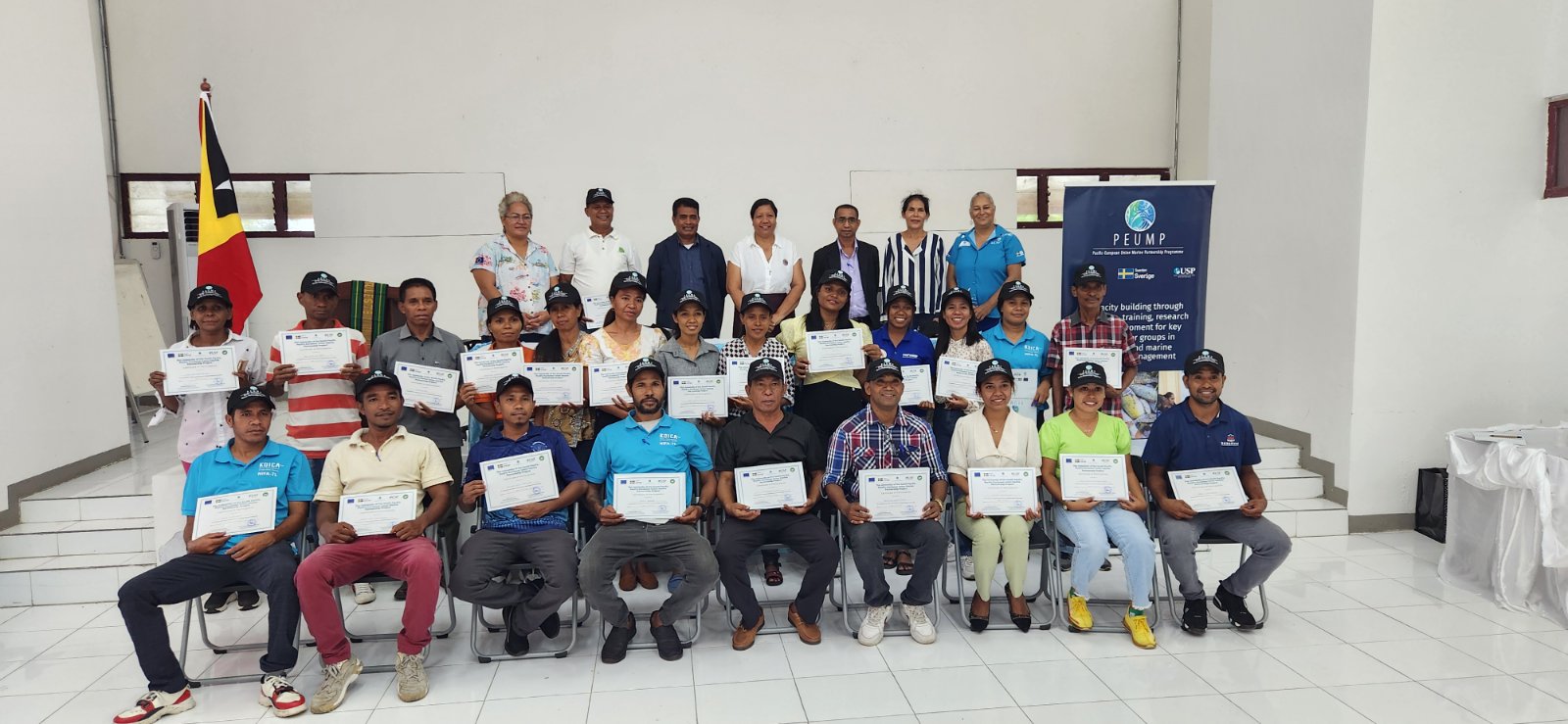Related News

Liquica, Timor Leste – [25 April, 2024]: Timor Leste, a nation facing significant challenges in food security and economic growth, has taken proactive steps to address these issues through targeted training initiatives. Despite abundant fisheries resources, the country continues to grapple with high unemployment, poverty, and malnutrition.
In response, capacity development efforts have been made to harness the potential of the fisheries sector through the Seafood Safety and Quality; and Money-minded Financial Literacy trainings provided by the University of the South Pacific-Pacific’s, Pacific-European Union Marine Partnership (USP PEUMP) programme, funded by the European Union and the Government of Sweden. A total of 53 trainees successfully completed the trainings – 25 technical and senior fisheries officers; while the remaining 28 consisted of small seafood business owners, fishermen/fisherwomen.
The Seafood Safety and Quality training, was conducted with the objective of improving the quality of fisheries produce, reducing post-harvest losses, and bolstering food security and economic growth. Participants gained valuable insights into seafood spoilage causes, learned best handling practices, and acquired skills to plan out simple quality control actions.
Complementing the efforts in seafood safety, the Money-Minded Financial Literacy Training targeted fishers and seaweed farmers, equipping them with basic financial management skills. Empowering participants to make informed decisions and manage their finances effectively, this initiative lays the groundwork for economic empowerment for coastal communities.

“These trainings represent crucial steps towards ensuring sustainable development and management of Timor Leste’s fisheries industry,” said His Excellency, Mr. Domingos da Conceição dos Santos, the State Secretary of Fisheries, Ministry of Agriculture, Livestock, Fisheries and Forestry of Timor-Leste. “I hope the trainings will build the capacities of our trainees as well as to help to transfer the skills they learn to local fisherman, vendors and middlemen,” he added.
“The ultimate purpose of the USP PEUMP programme is to focus on capacity development in fisheries and marine management with holistic business approaches in its programmes,” said Lavenie Tawake, USP PEUMP programme team leader. “The Seafood and Safety and Financial Literacy training programmes are targeted towards communities, small businesses and national needs with the aim to improve livelihoods and the sustainable development of coastal and marine resources, including production, collection, harvest, storage, transportation, marketing and trade”, Tawake stated.
These initiatives represent a concerted effort to enhance livelihoods, promote economic growth, and safeguard food security in Timor Leste. By investing in human capital and fostering partnerships, the nation is laying the foundation for a prosperous and sustainable future.
Atita De Araujo is a fisherwoman and village chief in Atauro Island, a participant of the Money Minded Financial Literacy training and said, “As Chief of Village and a steward of our coastal resources, I’ve gained invaluable insights into financial management through this enlightening training. Learning to save for both the present and future is empowering not just for myself, but for the vibrant network of women entrepreneurs I support. I eagerly anticipate the opportunity for future projects to further empower our community through such impactful training.”
“We need more training opportunities to address challenges in fish preservation and product transformation for income generation.” said Faustino Dos Santos Pereira, Instructor, National Institute of Fisheries and Aquaculture. “The Seafood Quality and Safety training was very insightful. I plan to incorporate these learnings into our training programs and share the knowledge with my colleagues to enhance knowledge and improve fish processing practices, especially in regions with limited facilities,” said Pereira.
These trainings have been carried out in Kiribati, Samoa, Timor Leste, Solomon Islands and Fiji with several more Pacific Island countries (PICs) to follow. Other upskilling programs include value chain analysis, upscaling community-based management and leadership training will follow for selected PICs.
USP is one of four key implementing partners of the PEUMP Programme, a EUR 45million program which promotes sustainable management and sound ocean governance for food security and economic growth while addressing climate change resilience and conservation of marine biodiversity.
It follows a comprehensive approach, integrating issues related to ocean fisheries, coastal fisheries, community development, marine conservation and capacity building under one single regional action. The PEUMP programme is housed within the Institute of Marine Resources within the School of Agriculture, Geography, Environment, Ocean and Natural Sciences (SAGEONS).